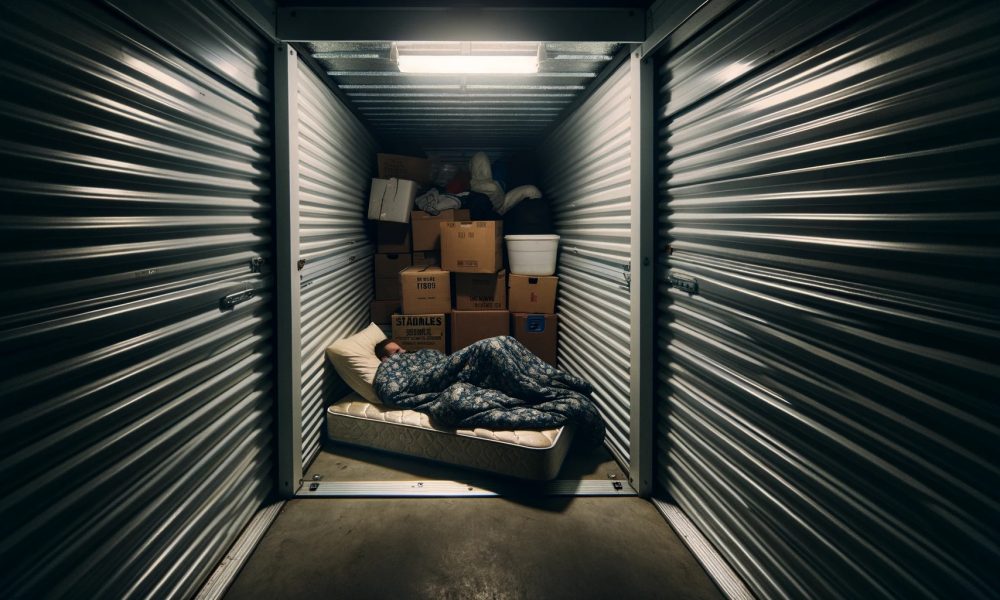
5 Reasons Why Living in a Storage Unit Is Illegal

Have you ever watched one of those reality TV shows where people turn storage units into amazing mini-homes? It is pretty creative, right? But hold on – before you start planning your own stylish, budget-friendly, storage unit makeover, there is a big question you need to answer: Is it legal to live in a storage unit? Spoiler alert: The answer is no. And while the idea might seem quirky and economically savvy, the reality is far less appealing due to numerous legal, safety, and health issues.

FrontStory / Here are some major reasons why you can not legally live or sleep in a storage facility.
Safety Risks
Is it legal to live in a storage unit when considering safety? Absolutely not. One of the primary reasons it is illegal to live in a storage unit is the significant safety risks involved. These units are not designed for human habitation.
They lack proper exits for emergencies, not to mention fire safety measures like smoke detectors and fire extinguishers. In the event of a fire, the consequences could be disastrous due to the confined space and potentially flammable materials stored nearby.

FrontStory / One of the major reasons why living (or sleeping) in a storage facility is illegal is that it is unsafe.
Apart from that, storage units often house items that emit fumes or are chemically unstable. Constant exposure to such conditions can pose serious health risks, further underscoring the safety concerns of living in such spaces.
Storage Units Lack Essential Amenities
Living in a space meant for storage means you are missing out on essential amenities. Storage units do not come equipped with plumbing, electricity, or heating and cooling systems that meet residential living standards. The absence of these fundamental services not only makes daily living extremely challenging but also raises significant health concerns.
Imagine going through extreme temperatures without any HVAC system or not having access to running water. Clearly, it is not a practical or healthy living situation.
Is It Legal to Live in A Storage Unit? NO!
Diving deeper into the core question – is it legal to live in a storage unit – you will find that zoning laws and residential codes are very clear: storage units are solely for storage and not zoned for residential use.
These regulations are in place to ensure that all living spaces meet the standards set for safety, health, and overall living conditions. Living in a storage unit is a direct violation of these laws. Thus, this can lead to legal repercussions including fines and eviction.
No Windows or Natural Light
Another significant issue with living in a storage unit is the lack of windows and natural light. Human beings require a certain amount of natural light for healthy living. It affects our sleep patterns, mood, and overall health. Storage units, being essentially large metal boxes, do not offer windows or any source of natural light. Thus, making them not only depressing but also unsuitable for prolonged human occupancy.

FrontStory / Typically, storage units do not have windows and natural lights. Hence, they are unsafe to live in.
The absence of windows also means poor air quality and ventilation, compounding the potential for respiratory problems and other health issues over time.
Security Concerns
Typically, these units are locked from the outside, which means in the case of an emergency, exiting the unit could become a life-threatening challenge. Additionally, living in such a secluded and unmonitored space can make you vulnerable to criminal activities.
Storage facilities are designed to secure objects, not people. Therefore, they are not equipped with the security measures necessary to protect residents like a typical apartment or house would.
So, is it legal to live in a storage unit? The clear answer is no, and for good reason. Instead of looking into such risky alternatives, exploring safe, legal housing options that ensure your well-being and peace of mind is always the best path forward.
More in Law Degree
-
New York to Mail Out One-Time Inflation Rebates. Here’s the Eligibility List
New York is preparing to send out its first-ever inflation refund checks, providing financial relief to millions of residents as prices...
October 3, 2025 -
Here’s What Artists Should Know About Copyright & Its Implications
Copyright protects your art from the moment you create it. The second your drawing, painting, sculpture, or photo is fixed in...
September 27, 2025 -
Everything to Know About Vogue America’s New Editor, Chloe Malle
Chloe Malle just stepped into one of the most powerful roles in fashion media: Head of Editorial Content at Vogue America....
September 21, 2025 -
Did Barron Trump Apply to Harvard? Clearing Up the Rumors
Speculation often swirls around public figures, and in recent months Barron Trump’s college choices became part of the conversation. Questions surfaced...
September 20, 2025 -
Can You Be Naked in Texas?
The Texas public nudity law isn’t as simple as “no clothes, you are in trouble.” It all comes down to intent,...
September 13, 2025 -
Why AI Is Now a Necessity, Not a Choice, for Law Firms
Artificial intelligence is no longer a futuristic concept for the legal industry. It is steadily changing how law firms operate, not...
September 13, 2025 -
Waikiki Lifeguard Cleared in Confrontation With Notorious Criminal
On a hot day at Kuhio Beach, veteran lifeguard Christopher Kekaulike Kam stepped in when things got out of control. A...
August 13, 2025 -
Gawking at the Coldplay ‘Kiss Cam’ Affair Is Voyeurism at Its Worst!
Coldplay concerts are meant to be joyful. But during a recent show, a playful kiss cam bit turned into a public...
August 6, 2025 -
Essential Safety and Success Resources for Trans Journalists
Trans journalists go through tough spaces every day. In a field that often tests your limits, knowing where to turn for...
July 30, 2025














